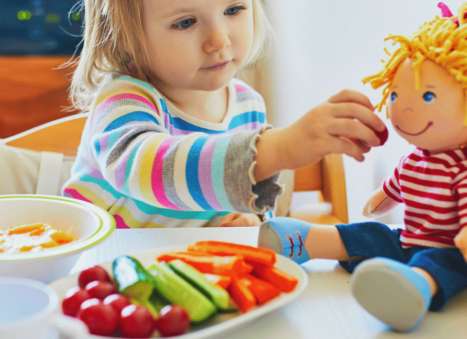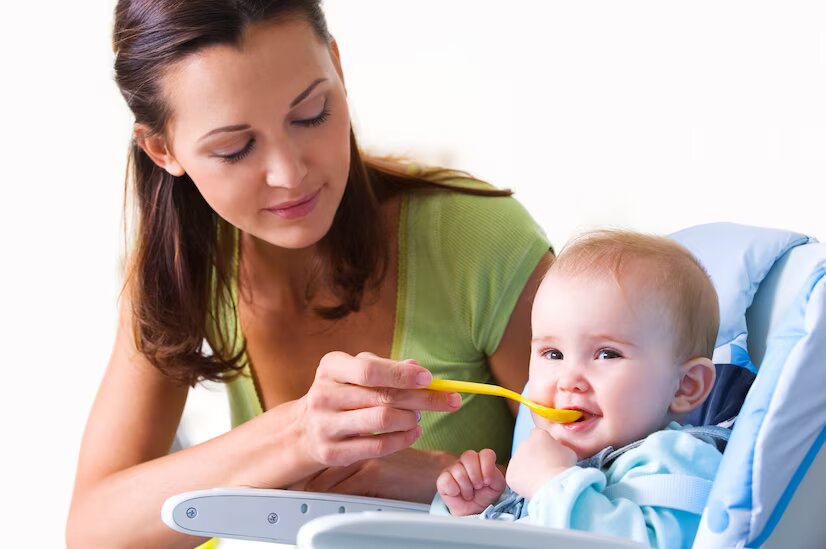
The Exciting Journey Begins: A Step-By-Step Guide To Starting Solids With Your Baby
Embarking on the journey of introducing solid foods to your baby is an exciting milestone in their development. As a parent, you may feel anticipation, joy, and anxiety for your baby’s first solids. However, the transition shouldn’t be as hard as you’ve heard for it to be.
But fear not! With the right guidance and a step-by-step approach to the baby’s first food starting solids, you can ensure a smooth transition into this new phase of your baby’s life.
In this comprehensive guide, we’ll walk you through starting solids, from the best time to the various food options, all while keeping your little one’s nutritional needs in mind.
Step-By-Step Guide To Starting Solids
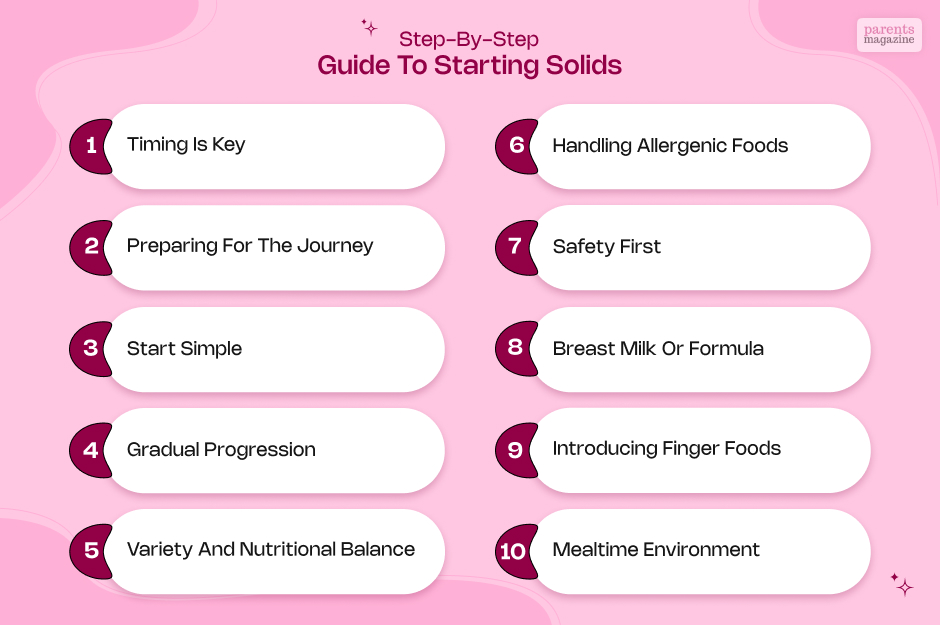
Let’s take ten steps to make the transition to food habits easier for you and your baby!
Timing Is Key:
The American Academy of Pediatrics recommends starting solids around six months of age. By this time, most babies have developed the necessary skills to handle solid foods, such as sitting up with minimal support and displaying an interest in what you’re eating.
However, every child is unique, so it’s essential to consult with your pediatrician to determine if your baby is ready for solids.
Preparing For The Journey:
Before diving into the world of solid foods, ensure you have the right tools and equipment. Invest in a highchair or a secure feeding seat to keep your baby safe and comfortable during mealtimes. You’ll also need small spoons and shallow bowls to serve food.
Opt for BPA-free, baby-safe feeding utensils, and dishes to ensure your little one’s well-being.
Start Simple:
It’s best to begin with single-ingredient, pureed foods when introducing solids. This approach allows you to identify and monitor potential allergies or digestive issues.
Good first foods include mashed bananas, pureed sweet potatoes, or rice cereal mixed with breast milk or formula. Start with small portions, offering one new food every three to five days while observing your baby’s reactions for any signs of intolerance or allergies.
Gradual Progression
As your baby becomes accustomed to purees, gradually increase the variety and texture of their meals. Introduce new fruits, vegetables, and proteins, such as mashed avocados, steamed carrots, or well-cooked chicken.
You can gradually increase the thickness of the purees and introduce mashed or soft foods for your baby to practice self-feeding. Always cut food into small, age-appropriate pieces to avoid choking hazards.
Variety And Nutritional Balance
As your baby grows, providing a diverse range of foods to support their nutritional needs is essential. Include a variety of fruits, vegetables, whole grains, and proteins in their meals.
This will expose them to different flavors and textures while ensuring they receive a wide range of essential nutrients. Encourage healthy eating habits from the start by offering a rainbow of colorful foods.
Handling Allergenic Foods
Recent research suggests that introducing potential allergens early on can help reduce the risk of developing allergies. Common allergenic foods include peanuts, eggs, dairy, wheat, soy, and fish.
Speak with your pediatrician before introducing these foods, especially if there is a family history of allergies. Start with small amounts and monitor your baby for any adverse reactions.
Safety First
When it comes to feeding your baby, safety is paramount. Always supervise your little one during mealtimes, never leaving them unattended.
Avoid giving your baby foods that are choking hazards, such as whole grapes, nuts, popcorn, or chunks of meat. Ensure that any food you offer is cooked thoroughly and cut into small, manageable pieces. Familiarize yourself with infant CPR, just in case.
Breast Milk Or Formula
Remember that even as you introduce solid foods, breast milk or formula will remain essential to your baby’s diet.
Continue to offer breast milk or formula before offering solids until your baby reaches around one year of age. This will ensure they receive the necessary nutrients for healthy growth and development.
Introducing Finger Foods
Around eight to ten months of age, your baby will be ready to explore finger foods. This stage allows them to develop their fine motor skills and practice self-feeding.
Offer soft, easily chewable foods like small pieces of cooked vegetables, soft fruits, or bite-sized cheese cubes. Encourage them to pick up and feed themselves, fostering independence and hand-eye coordination.
Mealtime Environment
Creating a positive mealtime environment is crucial for your baby’s development and enjoyment of food. Here are a few tips to enhance the experience:
- Maintain a regular feeding schedule to establish routine and familiarity.
- Minimize distractions like screens or toys to help your baby focus on eating.
- Sit together as a family during meals to promote social interaction and learning through observation.
Make mealtime enjoyable by engaging with your baby, using a happy tone, and encouraging.
How Starting Solids For Babies Is Important
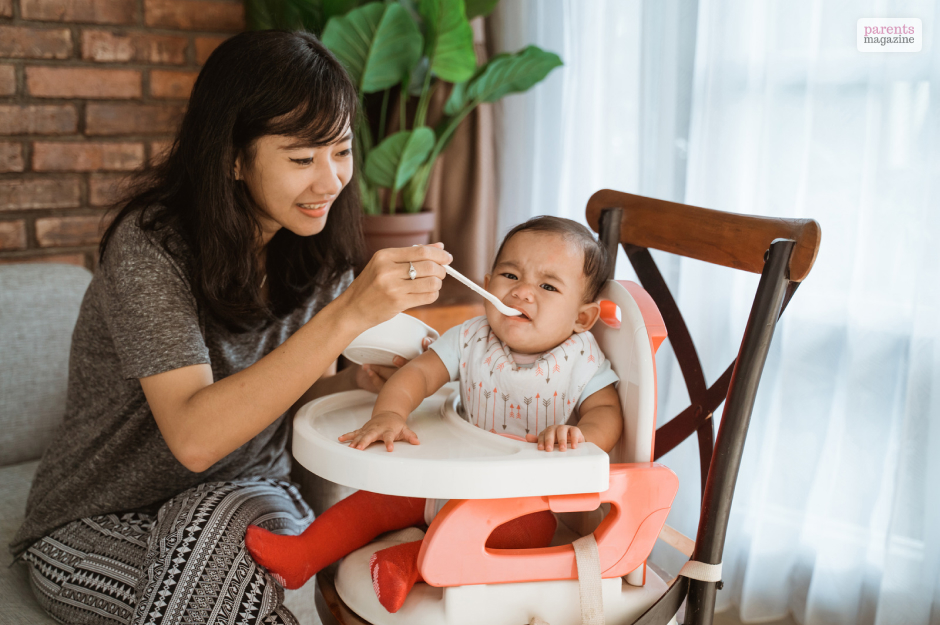
Starting solids for babies is an important milestone that plays a crucial role in their growth and development.
While breast milk or formula provides essential nutrients for the first few months of life, introducing solid foods introduces new flavors, textures, and nutrients that support their expanding nutritional needs.
Here are a few reasons why starting solids is significant for your baby:
- Meeting Nutritional Needs: As babies grow, their nutrient requirements increase. Solid foods provide additional nutrients like iron, zinc, calcium, and vitamins essential for their overall development, including brain development, bone health, and immune function.
- Developing Motor Skills: The transition from liquids to solids helps babies develop their oral motor skills, such as chewing, swallowing, and tongue movement.
- Expanding Taste Preferences: Introducing a wide variety of flavors and textures early on can help expand your baby’s palate and promote acceptance of a diverse range of foods later in life.
- Building Independence: As babies learn to self-feed, they gain a sense of independence and control over their meals. This process fosters their cognitive development, fine motor skills, and hand-eye coordination as they practice grasping and manipulating food.
- Family Bonding and Social Skills: Introducing solids allows babies to participate in family meals and creates opportunities for social interaction. Eating together as a family promotes bonding, communication, and the development of social skills.
It’s important to remember that every baby is unique, and the transition to solids may vary. Always consult your pediatrician for personalized guidance and recommendations based on your baby’s needs and development.
Getting your Baby Started with Solids: Do’s & Don’ts
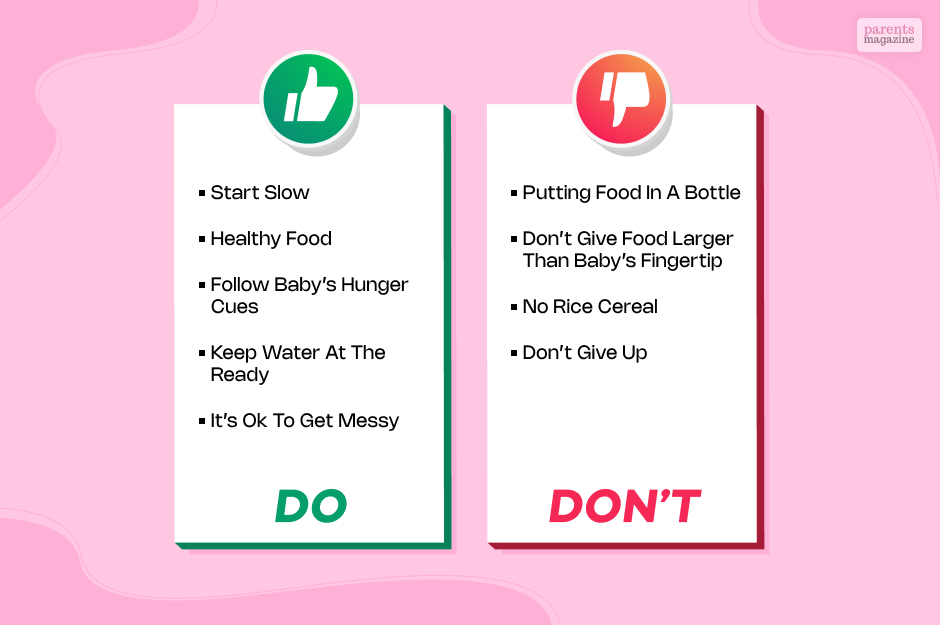
When getting your baby started with solids, there are a few things to keep in mind. This practice starts when your baby is 8 to 12 months of age.
There are several sample menus available on the American Academy of Pediatricians. But when it comes to some tips, you can build your checklist around the do’s and don’t we have listed down below –
Do’s
- Start Slow: Don’t overwhelm your little one’s tummy with multiple different complex food ingredients. This will upset their tummy and be quite challenging for their digestive system. So, start with a single ingredient that’s easy to digest and friendly for an eight-month-old toddler. You can smash a whole fruit or try pureed vegetables.
- Healthy Food: Again, the stress is always on healthy and single food items rather than an entire course of meals befitting elderly people. Whole-grain foods like brown rice, barley, and oatmeal are quite healthy and easy for toddlers to digest. These are also great for baby-led weaning.
- Follow Baby’s Hunger Cues: You are starting on solids. That’s great. But what about your baby’s hunger and their eating preferences? Don’t deny their cues in the rush to help them try solids. Look out for their reactions. See how much food they are comfortable with and if they really prefer what you are feeding. Building practice takes time. But, if you get constant negative cues, you might want to choose something different.
- Keep Water at the Ready: Your baby needs to have enough water throughout the time while trying out solid food. While trying solids for the first time, they might struggle to swallow whole-grain food. So, make sure to have sips of water ready.
- It’s Ok to Get Messy: Let your baby get messy. There’s no need to worry about their clothes getting dirty while trying out solids. It’s ok to get dirty. As long as they are happy eating, you can keep cleaning duty for later.
Don’ts
- Putting Food in a Bottle: I know there’s barely any chance of you doing it. But don’t ever put the baby’s solid food in a bottle. They aren’t drinking milk, and it’s solid food that your baby will eat and not swallow.
- Don’t Give Food Larger than Baby’s Fingertip: Since they are starting out, your baby needs to eat food that’s the size of their mouth. Don’t give too much food to make them choke.
- No Rice Cereal: Don’t feed your baby only rice cereal. Rice can have arsenic in it, and at this age, your baby might not be ready for rice cereals. Also, avoid giving them brown rice syrup as well.
- Don’t Give Up: Don’t stick to the first food you introduced as a solid. Try out different digestible whole foods within a week’s interval.
Conclusion
Starting solids with your baby is an adventure filled with new tastes, textures, and discoveries. With patience, guidance, and the right approach, you can give your little one a strong foundation for a lifetime of healthy eating habits.
Remember to consult your pediatrician, start with simple purees, gradually progress to more complex textures, and always prioritize safety.
Enjoy this exciting chapter in your baby’s growth and relish the moments of messy faces and pure delight as they explore the world of food.
You May Also Like To Read:
Already have an account?
Sign In
Create your account
User added successfully. Log in








